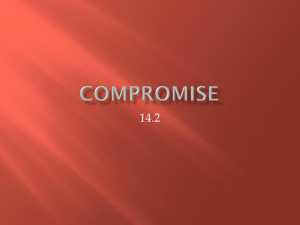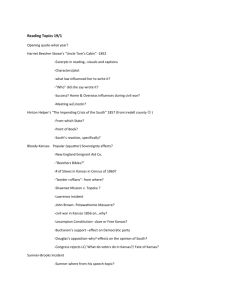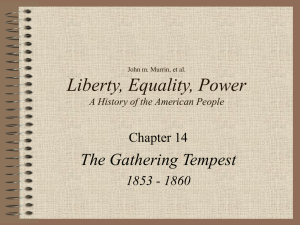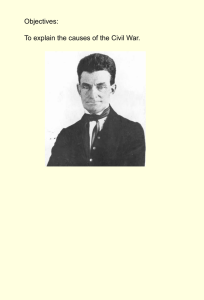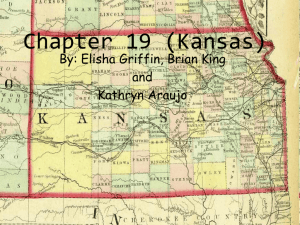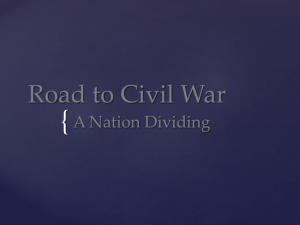The Crisis of the Union
advertisement
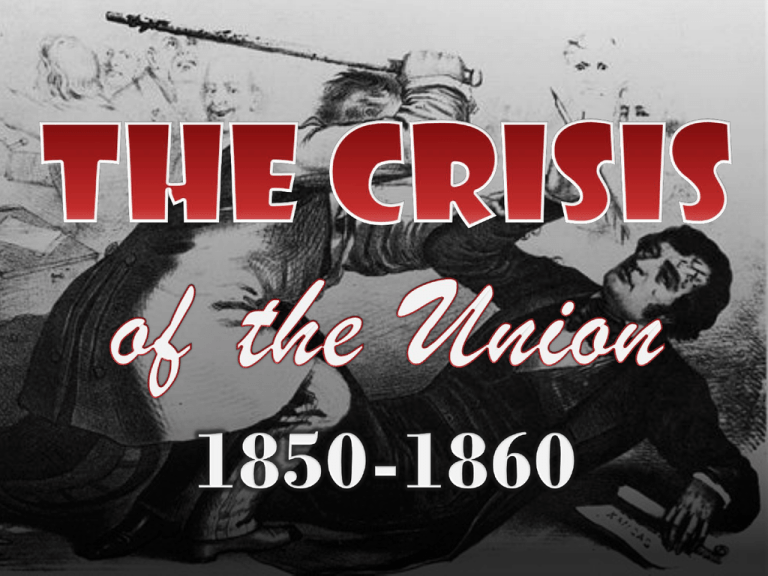
Evaluate the relative importance of political events and issues that divided the nation and led to civil war, including the compromises reached to maintain the balance of free and slave states, the abolitionist movement, the Dred Scott case, conflicting views on states’ rights and federal authority, the emergence of the Republican Party, and the formation of the Confederate States of America. For the North: 1. Admit as a For the South: Fugitive Slave Law 2. The New Mexico Territory: 3. 4. in Mexican Cession sells land / Federal Gov. assumes debt Slavery in Washington, DC: 5. Abolish in Washington, D.C. 1850 1860 The Compromise of 1850 was supposed to be the final compromise between the sections… and it was – just for different reasons than Clay had intended. Passed by Wisconsin and other Northern states – Guaranteed jury trials for accused slaves De facto Nullification Stowe Harriet Beecher Stowe’s bestselling anti-slavery novel (1852) Original Illustrations: http://utc.iath.virginia.edu/uncletom/illustra/53illf.html 1852 Presidential Election 1852 1856 1860 Franklin Pierce (D-NH) Fourteenth President of the U.S. 1853-1857 “Handsome Frank” Mexican War Veteran Kansas-Nebraska Act “Doughface” (Pro-Southern) NOT RENOMINATED “There's nothing left to do but get drunk." http://www.whitehouse.gov/history/presidents/fp14.html POPULAR SOVEREIGNTY In Kansas and Nebraska Territories on the issue of slavery MISSOURI COMPROMISE ANIMATED MAP: http://teachingamericanhistory.org/ne h/interactives/sectionalism/lesson3/ “Bleeding Kansas” “Race to Kansas” – Proslavery vs. Antislavery – “Border Ruffians” (from MO) – N.E. Immigrant Aid Society • Beecher’s Bibles ANIMATED MAP: http://teachingamericanhistory.org/ne h/interactives/sectionalism/lesson3/ 1855-1859 56 Dead “Beecher’s Bibles” New England Emigrant Aid Society "He (Henry W. Beecher) believed that the Sharps Rifle was a truly moral agency, and that there was more moral power in one of those instruments, so far as the slaveholders of Kansas were concerned, than in a hundred Bibles. You might just as well. . . read the Bible to Buffaloes as to [pro-slavery settlers]; but they have a supreme respect for the logic that is embodied in Sharp's rifle.” New York Tribune, 2/8/1856 Rev. Henry Ward Beecher (H.B. Stowe’s relative) “Bleeding Kansas” 1855-1859 56 Dead Lawrence, KS, after the “Sack of Lawrence” by proslavery settlers – Abolitionist – Pottawatomie Creek Massacre John Steuart Curry, “Tragic Prelude,” 1937-1941 Topeka Antislavery Lecompton Proslavery Republican Party Whig Party (1832-1854) FAIL • No longer viable after 1852 election • SPLIT: Northern Whigs and Southern Whigs Republican Party (1854-Present) Northern Whigs + Northern Free Soil Democrats • Free Soil – NOT abolitionist • (although abolitionists supported the Republican Party) • New England and “Northwest” power base Document 6.5 CHIVALRY DON QUIXOTE “The Crime Against Kansas” Charles Sumner US Senator (Mass.) Chivalry Brooks/Sumner Incident Rep. Preston Brooks (SC) Sen. Charles Sumner (MA) READ Sumner’s Speech READ Brooks’ Defense Nativism = Anti-Immigration Anti-Catholic violence St. Augustine’s Church on Fire The American Party “Know Nothings” NATIVISM CATHOLICS IMMIGRANTS NOTE: Antebellum immigrants were “I know nothing…” mostly from Germany and Ireland. “Citizen Know Nothing” A Mascot for the Movement Ted Nugent: A Real American Click for Article 1856 Presidential Election 1852 1856 1860 Confound the Gun! if I can only get out of this muss I’ll stick to preaching and let fire-arms alone. Oh! Brother Beecher! Our Kansas Gun has bursted and upset our gunner. I’m afraid we put in too big a load. Abolition Bog Ah! Fremont, your sectional Gun has exploded just as I predicted, but my American rifle will bring down that Old Buck. James Buchanan (D-PA) Fifteenth President of the U.S. 1857-1861 Pierce’s Minister to Great Britain – abroad during Kan/Neb Act controversy Sectional Turmoil Escalated Indecisive concerning secession Only bachelor to occupy the White House http://www.whitehouse.gov/history/presidents/jb15.html FACTS OF THE CASE: Dred Scott, a slave, lived with his master in free territory for two years. Scott claimed this made him a free man. THE DECISION: 1. People of African descent (incl. Scott) could not be U.S. citizens. 2. Congress can’t forbid slavery in federal territories (violation of property rights) – Ergo, the Missouri Compromise is Unconstitutional Judicial Activism Judicial Activism When Judges Write the Law EXECUTIVE LEGISLATIVE JUDICIAL BRANCH BRANCH BRANCH President Congress Supreme Court ____________ Laws _____________ Laws ____________ Laws “Slave Power” Conspiracy? • Illinois Senate Race – Stephen Douglas • (Democratic Incumbent) – Abraham Lincoln • (Republican Challenger) • FOCUS: Free Soil • Significance: – Douglas wins, but loses popularity in the South. – Lincoln becomes a national figure. Lincoln-Douglas Debate Memorial OBJECTIVE: – Seize a federal arsenal • Harpers Ferry, VA TREASON – Tried, Convicted, Executed – Different reactions in North and South NORTH: “Slave Power” Conspiracy The South wants to spread slavery throughout the nation Mason-Dixon Line SOUTH: North plans to destroy Southern slavery by igniting slave revolts. 1860 Presidential Election 1852 1856 1860 Abraham Lincoln (R-IL) Sixteenth President of the U.S. 1861-1865 Democratic Party split Election prompted secession of states in the Deep South http://www.whitehouse.gov/history/presidents/al16.html
